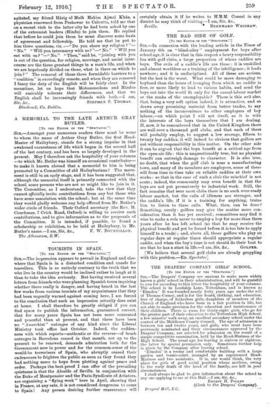1.116 BAD SIDE OF GOLF.
[To THE EDITOIL OP THE "SPECTATOR.") SIR,—In connexion with the leading article in the Times of January 6th on " blind-alley " employment for boys after school age, it is clear that in this respect a heavy responsibility lies with golf clubs, a -large proportion of whose caddies are boys. The evils of a caddie's life are these : it is unskilled and almost worthless as a training of the intelligence ; it leads nowhere; and it is undisciplined. All of these are serious, but the last is the worst. What could be more damaging to boyhood than the hours of lounging from which no caddie is free, or more likely to lead to vicious habits, and send the boys out into the world fit only for the casual-labour market or the ranks of the unemployable? There is this evil also, that, being a very soft option indeed, it is attractive, and se draws away promising material from better trades, to say nothing of the inconvenience to other' employers of boy labour,—on which point I will not dwell, as it is with the interests of the boys themselves that I am dealing. If, now, it be remembered that in the United Kingdom there are well over a thousand golf clubs, and that each of these will probably employ, to suggest a low average, fifteen to twenty boy caddies, it will indeed be obvious that golfers are not without responsibility in this matter. On the other side it can be argued that the boys benefit at a critical age from the open-air life : this is unquestionably true, but no physical benefit can outweigh damage to character. It is also true, no doubt, that when the golf club is near a manufacturing town, and many of its members are ,employers, some of these will from time to time take on reliable caddies at their own works : so that in the case of such a club the mischief is not acute ; indeed, the community may even benefit in that the boys are not put prematurely to industrial work. Still, the fact remains that near most clubs there is no such ever-ready labour market, but the calls of idleness are stronger, and the caddie's life, if it is a training for anything, trains him to listen to these calls. What, then, can be done? Something, surely: golfers may give the matter more con- sideration than it has yet received ; committees may find it wise to make a rule never to employ a boy for more than three years after he has left schOol (so that he may receive the physical benefit and yet be forced before it is too late to apply himself to a trade) ; and, above all, those golfers who play on regular days' at regular times should appropriate a regular caddie, and when the boy's time is out should do their best to see that he has a start in life.—I am, Sir, &c., GOLFER. [We believe that several golf clubs are already grappling with this problem.—ED. Spectator]










































 Previous page
Previous page